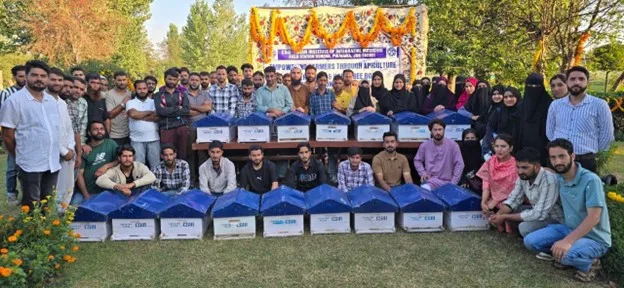Srinagar, Sept 11: In a significant effort to bolster the apiculture sector in Jammu & Kashmir, CSIR-Indian Institute of Integrative Medicine (IIIM) Jammu distributed 430 apiculture units to 43 farmers across districts, including Pulwama, Baramulla, Budgam, Shopian, and Ganderbal.
The event took place today at the CSIR IIIM Field Station in Bonera, Pulwama, marking the culmination of a 10-day program on “Entrepreneurship Development and Farmer Empowerment through Capacity Building” under the CSIR Floriculture Mission.
The ceremony was attended by prominent officials and experts, including Dr Zabeer Ahmed, Director of CSIR IIIM; Dr Basharat Qayoom, IAS, Deputy Commissioner of Pulwama; Er. Abdur Rahim, Head of CSIR IIIM Branch Lab Srinagar; Dr Shahid Rasool, Principal Scientist and Incharge of the CSIR IIIM Field Station Bonera; along with officers, researchers, 80 farmers, agri-entrepreneurs, and local citizens.
During the event, Chief Guest Dr Basharat Qayoom highlighted the importance of apiculture for rural livelihood enhancement, especially in Pulwama and other parts of Kashmir, due to the region’s rich nectar-bearing floral biodiversity. He mentioned the collaborative efforts of CSIR-IIIM with local farmers and entrepreneurs through various farm-based programs, which have strengthened income generation opportunities and promoted rural bio-entrepreneurship.
Dr Qayoom congratulated CSIR IIIM scientists for developing India’s first monofloral Lavender Honey, which is set to gain geographical indication (GI) registration, putting Pulwama on the global map for specialty honey production.
In his address, Dr Zabeer Ahmed reaffirmed CSIR IIIM’s commitment to farmer-centric innovations and grassroots technology transfer. “The CSIR Floriculture Mission aims to diversify farmers’ income by promoting floriculture crops and value-added products,” he said. Dr Ahmed highlighted the role of apiculture in enhancing food productivity, supporting pollination, and contributing to sustainable agro-ecosystems.
Addressing the participants, Er Abdul Rahim discussed the market potential for high-quality honey and other apiculture products. “Adopting scientific apiculture practices can help farmers maximise income while ensuring products meet national and international quality standards,” he said, adding that this initiative aligns with CSIR IIIM’s broader goal of fostering sustainable farming and rural empowerment in Jammu and Kashmir.
Earlier, Dr Shahid Rasool provided a comprehensive overview of the CSIR Floriculture Mission, which aims to expand the floriculture sector through region-specific crops and effective marketing strategies. He said that one vertical of the mission focuses on integrating apiculture with nectar-bearing crops to produce quality honey and value-added products.
The programme featured demonstrations on modern beekeeping practices, disease management in apiaries, and integrating apiculture with floriculture to boost crop productivity and farmer income. As part of the initiative, 430 honey bee boxes, technical manuals on scientific beekeeping, and certificates were distributed to the 43 trained beneficiaries to support their livelihood endeavours.
The event concluded with an interactive session between experts and participating farmers, fostering knowledge exchange and future collaboration in the apiculture sector.






